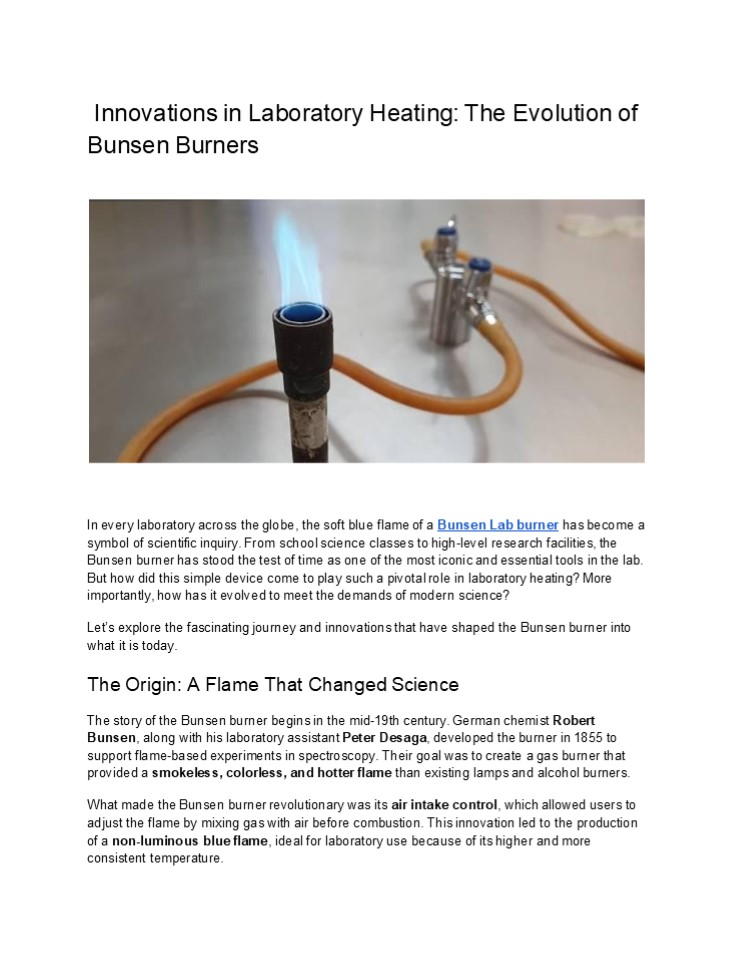Innovations in Laboratory Heating_ The Evolution of Bunsen Lab Burners
Title: Innovations in Laboratory Heating_ The Evolution of Bunsen Lab Burners
1
Innovations in Laboratory Heating The Evolution
of Bunsen Burners
In every laboratory across the globe, the soft
blue flame of a Bunsen Lab burner has become a
symbol of scientific inquiry. From school science
classes to high-level research facilities, the
Bunsen burner has stood the test of time as one
of the most iconic and essential tools in the
lab. But how did this simple device come to play
such a pivotal role in laboratory heating? More
importantly, how has it evolved to meet the
demands of modern science? Lets explore the
fascinating journey and innovations that have
shaped the Bunsen burner into what it is
today. The Origin A Flame That Changed
Science The story of the Bunsen burner begins in
the mid-19th century. German chemist Robert
Bunsen, along with his laboratory assistant Peter
Desaga, developed the burner in 1855 to support
flame-based experiments in spectroscopy. Their
goal was to create a gas burner that provided a
smokeless, colorless, and hotter flame than
existing lamps and alcohol burners. What made the
Bunsen burner revolutionary was its air intake
control, which allowed users to adjust the flame
by mixing gas with air before combustion. This
innovation led to the production of a
non-luminous blue flame, ideal for laboratory use
because of its higher and more consistent
temperature.
2
- How a Bunsen Burner Works
- To understand how the device has evolved, its
important to grasp the basic principles. A
traditional Bunsen burner consists of - A base Connects to a gas source.
- Barrel (chimney) Where the air and gas mix.
- Air vents Adjustable openings at the bottom of
the barrel to control airflow. - Collar Used to open or close air vents.
- Gas valve Regulates gas flow.
- By adjusting the air vents and gas flow, users
can create two types of flames - Luminous Flame (Yellow) Cooler, used when the
burner is not actively in use. - Non-Luminous Flame (Blue) Hotter, ideal for
heating and sterilizing.
3
- Automatic shut-off systems that cut the gas
supply if the flame goes out. - Cool-touch materials for user protection.
- These safety features are especially valuable in
school laboratories and crowded research
environments where accidents can occur. - Fuel Flexibility
- Traditional Bunsen burners were designed for
natural gas, but newer models support a variety
of fuel sources including butane, propane, and
LPG (liquefied petroleum gas). Some portable
models even use refillable fuel cartridges,
offering flexibility in settings where a fixed
gas line isnt available. - Eco-Friendly and Energy-Efficient Designs
- Modern burners are being designed with energy
efficiency and sustainability in mind. Reduced
gas consumption, cleaner combustion, and
environmentally friendly materials are key focus
areas. This shift not only helps institutions
meet environmental standards but also reduces
operating costs over time. - Smart Integration in Digital Labs
- As laboratories become more digitized, some
high-end Bunsen burner models are being
integrated into smart lab systems. These systems
allow remote operation, data logging, and even
programmable heating patterns. Such integration
is valuable in research that requires precise
repetition or automation. - Supertek Glassware Keeping Innovation Alive
- At Supertek Glassware, we understand that even
the most classic tools need to evolve. Our range
of Bunsen lab burners is engineered with the
perfect balance of tradition and technology.
Whether youre outfitting a high school science
lab or a high-end pharmaceutical RD facility, we
offer burners that are
4
The next generation of Bunsen burners may include
even smarter integrations, including AI-assisted
flame control, automated shut-off sensors, and
voice command capabilities. As laboratory
standards become more stringent and technology
continues to evolve, the Bunsen burner will
undoubtedly adaptcontinuing to burn brightly as
a symbol of scientific progress. Final
Thoughts The Bunsen burners journey from a
19th-century invention to a 21st-century lab
essential is a testament to its enduring
relevance. Its simplicity, adaptability, and now,
its innovative design upgrades, make it an
indispensable tool in any science lab. Whether
youre a seasoned researcher or a budding
student, understanding the evolution of the
Bunsen burner gives you a deeper appreciation of
the tools that fuel discovery. And at Supertek
Glassware, were proud to be part of that
journeyproviding safe, smart, and reliable
burners for labs across the world. Ready to
upgrade your lab setup? Visit SupertekGlassware
to browse our premium lab burners and accessories.

